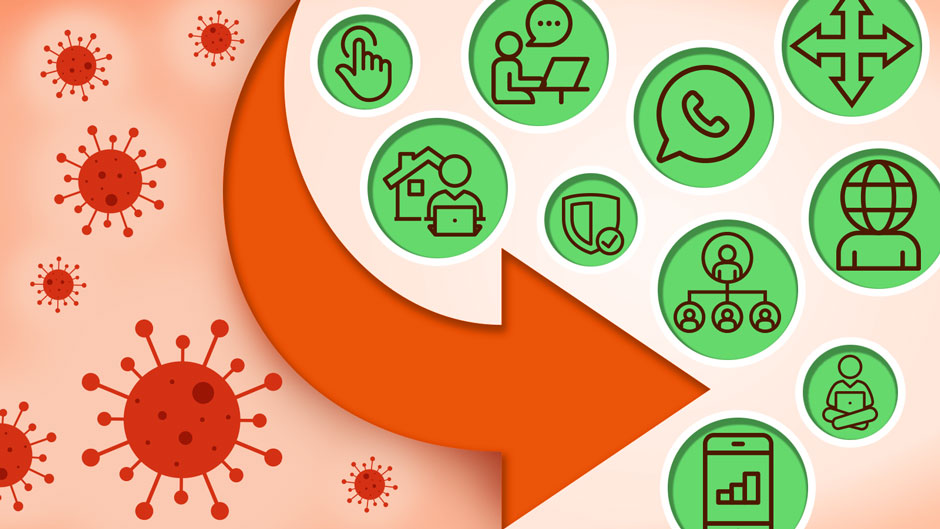The University of Miami continues to closely monitor the current coronavirus (COVID-19) outbreak. Since the first reports of the novel coronavirus in China surfaced two months ago, the University has been working to safeguard the health and well-being of all members of the University community and planning for a broad range of contingencies.
Jacqueline Travisano, executive vice president for business and finance and chief operating officer oversees the University’s business operations: human resources, information technology, facilities operations and planning, finance, police department, audit and compliance, and emergency management.
Here, Travisano discusses how the University is preparing to take action should COVID-19 have a significant impact on our campuses.
Q: What is the University doing to prepare for the potential impact of COVID-19?
Travisano: Our first priority is always the health and safety of everyone in our ’Canes community. ’Canes care for ’Canes, and we are working closely together daily to make the best decisions for our students, faculty, staff, and patients.
To be clear, the possibility of a significant impact of COVID-19 on our campuses is still low. However, we have a solid, well-established and tested emergency management plan, and our experience with numerous hurricanes and other emergencies has helped ensure we are ready for any type of emergency.
We are working closely with Pat Whitely, vice president for student affairs, to coordinate efforts in support of our students. Also, our emergency management team—led by Matt Shpiner on the Coral Gables campus, Vince Torres on the medical campus, and John Gulla on the marine campus—has the confidence of the leadership team to guide us through whatever comes our way.
Matt, Vince, and John have done an excellent job of gathering core leadership teams from across the institution to review contingency plans and actions for all of the University’s areas: business operations, academics, research, medical, students and residential life, and communications.
Q: What does this coordinated effort look like?
Travisano: It changes depending on the day, but typically the core leadership teams are communicating with each other, sometimes up to three times per day—in the morning, mid-afternoon, and evening—to discuss new information, campus-wide emergency notifications, and preventive actions.
Matt, Vince, and John and their emergency management teams are really great examples of how similar units from our Coral Gables, medical, and marine campuses can work together to make the U stronger as a whole.
Finally, we continue to work closely with government and public health agencies and follow guidelines from the Florida Department of Health, Centers for Disease Control and Prevention, and the World Health Organization.
Q: What are some of the contingency plans if COVID-19 infections are found on the University’s campuses?
Travisano: This is a fluid situation and we cannot predict with certainty what will evolve over the coming days and months. With that uncertainty, we are making key decisions to protect the health and safety of our community, while balancing the need for continuity.
For example, like many institutions of higher education around the country, we’re creating contingency plans around telework arrangements. We may reach a point where faculty, staff, and students may be unable to teach, attend classes, or complete work in an office setting because of illness or the need to self-isolate.
To prepare, Provost Jeffrey Duerk and I are focused on creating additional support for technologies that allow employees to work from home, and faculty members and students to continue their teaching and learning activities with minimal disruption—even if physical classroom attendance or traditional instruction is not possible.
Provost Duerk and I are encouraging leaders to develop their own contingency plans around telework arrangements for their teams, all faculty, staff, and students should learn how to use academic and business continuity tools now, before they are needed, in the event COVID-19 reaches our campuses.
Q: How are campus facilities being maintained?
Travisano: Our facilities operations and planning team is working hard to ensure restrooms, common areas, and high traffic areas, including shuttles, are being sanitized routinely. Also, more than 400 hand sanitizers are installed across campus buildings and in shuttle buses.
Q: What can faculty, staff, and students do to prevent the spread of the virus and prepare?
Travisano: I think we all need to continue to use good judgment. If you are sick, please stay home. Continue to practice good hygiene, such as washing your hands frequently and covering your cough or sneeze with a tissue. Also, stay informed on new information from the CDC and other health authorities.
Q: What is the University’s position on travel?
Travisano: We are doing our best to cause the least disruption among our University community. Details about travel have been outlined in the latest University advisory, but in general, there currently are no restrictions on domestic travel for academic or business purposes; however, individuals should evaluate whether such travel is essential or could be delayed. Future decisions about domestic travel will be contingent on CDC guidance.
Q: What else can we do and how do we stay informed?
Travisano: I know that fears are heightened right now because there is so much that is still unknown. Our leadership team recognizes that the decisions we make affect members of our community both personally and professionally.
We want everyone to know that our focus is on the health and well-being of the University community, as well as on the continuity of University operations.
People can stay informed by visiting the University’s coronavirus site for regular updates, including the latest messages.
This site includes the most up-to-date information about University actions and decisions. There are many rumors circulating and inaccurate information being written and discussed about University operations related to the coronavirus. I would ask everyone in our community to review the dedicated University coronavirus site if they are in doubt.

